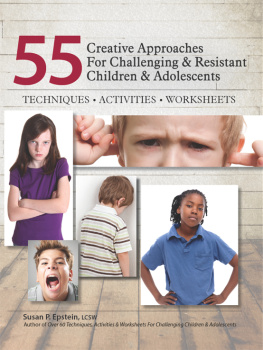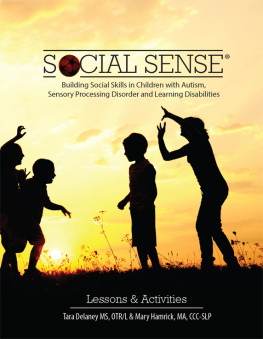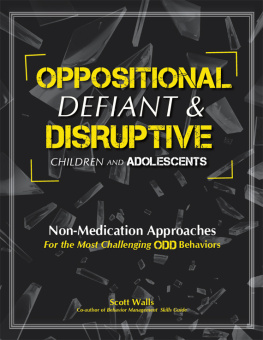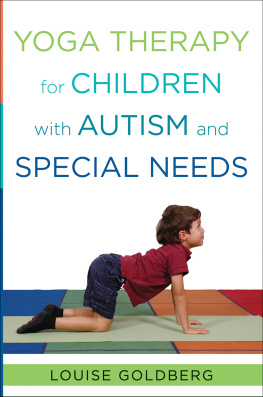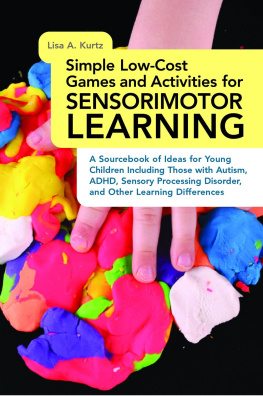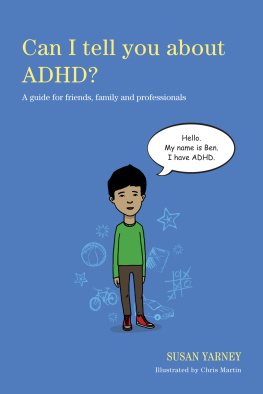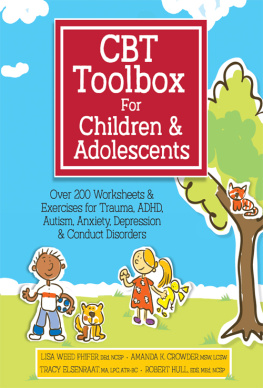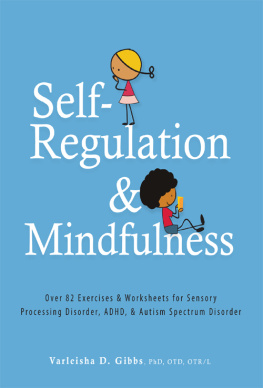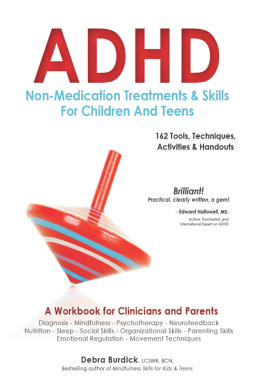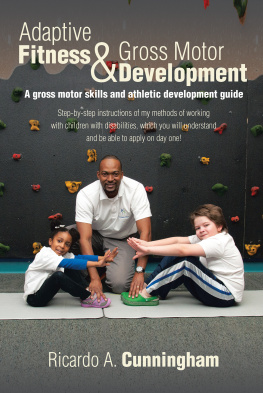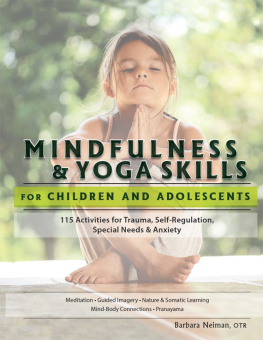55 Creative Approaches
For Challenging & Resistant
Children & Adolescents
TECHNIQUES ACTIVITIES WORKSHEETS
Susan P. Epstein, LCSW
Copyright 2014 by Susan Epstein, LCSW
Published by
PESI Publishing & Media
PESI, Inc
3839 White Ave
Eau Claire, WI 54703
Cover Design: Amy Rubenzer
Layout Design: Bookmasters
Edited by: Marietta Whittlesey
Printed in the United States of America
ISBN: 978-1-937661-27-4
All rights reserved.
Thank you to my husband, Michael, for your belief in me and support; to my parents, Naomi and Nathan Paulson, the most amazing role models a girl could ask for; and my children, Sarah and Daniel Rosenkrantz, the guinea pigs of my parenting experiments.
Table of Contents
About the Author
For more than 30 years, Susan Epstein has been a Licensed Clinical Social Worker, author, trainer, educator, and presenter. This is her second book with PESI Publishing and Media. Susan has also written and published four parenting books:
The Take Back Your Parenting Powers System, Are You Tired of Nagging? How to Get Cooperative Kids, Your Out-Of-Control Teen, and The Little Book With A Lot of Attitude: A Guide to Parent- Teen Communication. Susan also co-authored a childrens book about death, loss, and healing titled The Cat Who Lost Its Meow.
She founded Parenting Powers in 2007 (www.ParentingPowers.com), a parent-coaching company that provides coaching, tele-classes, and in-home parent-coaching programs. In 2009, Susan partnered with Dr. Wayne Scott Andersen (NY Times Best Selling Author), leader and visionary with a goal to eradicate obesity in America. Susan is a Certified Health Coach through the Villanova University College of Nursing. She coaches clients, and trains and mentors health coaches all over the U.S. In 2013, Susan created and launched a virtual group coaching/supervision program for professionals working with challenging kids. Susan has been quoted as an expert in Family Circle, Parents Magazine, American Baby Magazine, and New York Magazine, along with regular radio and television appearances.
Introduction
A Letter to Parents and Caregivers
Agatha Christie once said, I like living. I have sometimes been wildly, despairingly, acutely miserable, racked with sorrow, but through it all I still know quite certainly that just to be alive is a grand thing.
This quote reminds me of what it is like parenting on the rough days, the days when the kids dont listen, when your son or daughter is suspended from school, or when you find something you wish you hadnt found in your kids room. These days are heart-wrenching, and they test us as parents.
How much patience do we have? How much grief and hardship must we endure? But even on the very worst days, we wouldnt trade our kids in or throw in the towel. We regroup and muster our strength; we are not sure how we do it, but we get up the next day determined to once again be the best parents we know how to be.
We do it, because we know that they need us. We do it because we are their best teachers. We do it because we love them and want them to grow up into good, productive, loving adults, who will do the same for their kids.
If you are like most parents, however, sometimes, you just dont know what to do or how to handle a given situation. If your child has been suspended from school, does that mean that you should also have a consequence at home, and if so, what should it be? How much? How harsh?
Remember, you are your childs best teacher. So when you do consequence, dont do it out of anger. Make it a teaching moment. Make it meaningful. Make it something your child will always remember.
Section I
Quick Tips for Rules and Boundaries
A Boat without a Rudder
Many parents and caregivers feel that they can never do enough to please their kids. The more they give, the more their kids beg for more.
As humans, we want to be liked. We feel uncomfortable when someone is angry with us or gives us the cold shoulder. We will do anything to not be distanced from or in conflict with others. The problem with this and parenting is that it gets messy. The childrens whining and complaining get to us and wears us down. Then we give in and let them have their way. Once youve fallen into this pattern, its difficult to find your way out because, in an effort to get his or her way and to maintain the power, your child becomes even angrier than the last time.
When children become teens, it may seem as if they are closer to their friends than to their own family members, and this can feel hurtful. Remember, you want to be liked, and now they act as if they hate you! Some parents feel that they have to bend over backward to get any attention or to connect with their own kid.
This is where we as parents get into trouble. When parents want kids to like them, they might say yes when they really need to say no, or they might overlook it when they say, "Whatever," or roll their eyes. In an effort not to fight or make waves, parents give in over and over again. Remember the old saying Give them an inch, and theyll take a yard?
The real truth is that even if it seems that they are disconnecting from you and the family, children need boundaries and rules and want you to provide structure and set limits. Kids need direction, and if adults dont provide that, children are like boats without a rudders at sea.
Being a good parent can hurt or feel uncomfortable, but having your kid get in trouble in school or in the community hurts more.
Walls: Creating Rules that Make Sense
Before I built a wall Id ask to know what I was walling in or walling out.
Robert Frost
PURPOSE
To define rules that are logical and reasonable and that provide a teachable moment, use the following questions to clarify the rules you currently have.
Common Questions and Complaints about Kids
Why wont my kids listen?
_________________________________________
Why do they break my rules?
_________________________________________
Why are they so disrespectful?
_________________________________________
Why are they so angry?
_________________________________________
Questions to Ask Instead
What are you asking them to do that they are not listening?
_________________________________________
What is the purpose of the rules you have created?
_________________________________________
How do you deal with disrespect?
_________________________________________
Why are you so angry?
_________________________________________
W ORKSHEET : B EFORE I B UILD A W ALL
If you have a rule, know why and if you are looking for a place start; develop these rules under these categories:
Ensuring Safety
1. (Example) No texting while driving.

